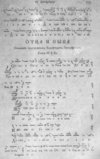|
|
| Line 4: |
Line 4: |
| | </div> | | </div> |
| | | | |
| − | [[Image:nj2.jpg|100px|left]] | + | [[Image:Byzantine Notation.jpg|100px|left]]Strictly speaking, '''[[Byzantine Chant]]''' is the sacred [[Church Music|chant]] of Christian Churches following the Orthodox rite. This tradition, encompassing the Greek-speaking world, developed in [[Eastern Roman Empire|Byzantium]] from the establishment of its capital, Constantinople, in 330 until [[Fall of Constantinople|its fall]] in 1453. It is undeniably of composite origin, drawing on the artistic and technical productions of the classical age, on [[Judaism|Jewish]] music, and inspired by the monophonic vocal music that evolved in the early Christian cities of Alexandria, Antioch, and Ephesus. In the [[Orthodox Church]] today, many churches use Byzantine Chant as their primary musical tradition, including the Churches of [[Church of Constantinople|Constantinople]], [[Church of Alexandria|Alexandria]], [[Church of Antioch|Antioch]], [[Church of Jerusalem|Jerusalem]], [[Church of Romania|Romania]], [[Church of Serbia|Serbia]], [[Church of Greece|Greece]], and [[Church of Cyprus|Cyprus]]. |
| − | Our father among the [[saints]] '''[[Nicholas of Japan]]''', [[Equal-to-the-Apostles|Equal to the Apostles]] ([[August 1]], 1836 – [[February 3]], 1912), brought Orthodoxy to [[Orthodoxy in Japan|Japan]]. He was sent to Japan as a [[missionary]] by the [[Church of Russia]]. He worked tirelessly among the Japanese people and established there the [[Church of Japan]]. His [[feast day]] is [[February 3]].
| |
| | | | |
| − | Throughout his life, St Nicholas set an example of a true spiritual director wholly devoted to his ministry. He was a man of inexhaustible energy, firm commitment, and outstanding efficiency. He said once: ''"I consider it inappropriate for a missionary to retire unless he is totally unable to serve. I have never tried on a 'robe de chambre,' not even in my dreams. I would better die on the field where God's Providence destined me to plough and sow."''
| + | The Byzantine chant scale consists of seven notes: |
| − | | |
| − | His private life was that of an [[asceticism|ascetic]]. He never tried to perform any special feat, but rather surrendered his entire soul to God. His life was marked with hardships and willfulness, self-appraisals and tiredness, and the feebleness of an old man. However, the saint's life was a clear manifestation of success in overcoming these hardships through the fulfilment of [[Christ]]'s commandments, shown to the whole world.
| |
| − | | |
| − | '''''Recently featured:''' [[Bede]], [[Gregory Palamas]], [[John Chrysostom]], [[Filioque]]. Newly [[:Category:Featured Articles|featured articles]] are presented every other '''Friday'''.''
| |
Revision as of 19:35, January 20, 2006
Strictly speaking,
Byzantine Chant is the sacred
chant of Christian Churches following the Orthodox rite. This tradition, encompassing the Greek-speaking world, developed in
Byzantium from the establishment of its capital, Constantinople, in 330 until
its fall in 1453. It is undeniably of composite origin, drawing on the artistic and technical productions of the classical age, on
Jewish music, and inspired by the monophonic vocal music that evolved in the early Christian cities of Alexandria, Antioch, and Ephesus. In the
Orthodox Church today, many churches use Byzantine Chant as their primary musical tradition, including the Churches of
Constantinople,
Alexandria,
Antioch,
Jerusalem,
Romania,
Serbia,
Greece, and
Cyprus.
The Byzantine chant scale consists of seven notes:
